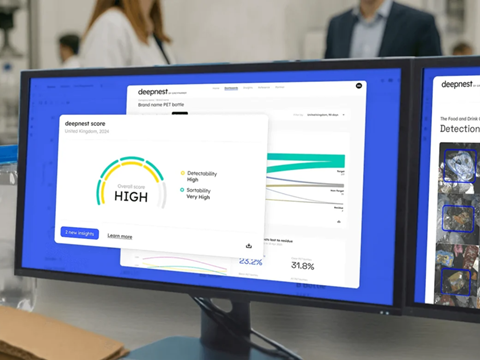
Unilever, Amcor, and Asahi are among the first to trial Deepnest, Greyparrot’s ‘world-first’ AI waste intelligence platform that provides brands with product-level recyclable waste data and addresses knowledge gaps.
Greyparrot explains that a lack of available data and the limitations of waste infrastructure leave companies in the dark about the end-of-life treatment of their packaging. In turn, consumer goods brands cannot use real-world recycling rates to inform their product innovation, testing centres, or consultancy efforts.
At the same time, virgin plastic taxes and EPR fees are set to cost global businesses up to $100 billion (€84,921,000,000) every year by 2040, yet around 95% of plastic packaging is thought to be discarded after one use.
Greyparrot’s response is Deepnest, which is designed to track packaging performance by brand, material, product type, and region. Using Greyparrot Analyzer AI-camera systems in material recovery facilities, it follows packaging through the waste system and records which units are sorted, recycled, or lost.
The collected data contributes to what Greyparrot describes as the ‘most comprehensive’ database for household packaging waste, which can be used to help brands address the knowledge gap and improve their products and business models.
In particular, Deepnest offers actionable insights and generates recommendations to help customers improve the sustainability metrics of their packaging in priority markets, ranging from material composition to shape and colour.
Brands can use the platform to compare their recycling performance to that of market competitors and to category standards; test and compare packaging formats within sub-brands before they are scaled across the entire portfolio; and help gauge the impact of their packaging innovations, circularity interventions, and R&D efforts.
Right now, Greyparrot Analyzer systems are believed to process more than 40 billion waste objects annually across over 20 countries, and to detect $1 billion (€848,740,000) worth of recycled materials in the waste streams they monitor. If they are rolled out globally, they are anticipated to create up to $100 billion (€84,921,000,000) in recyclable value every year by 2040.
Overall, Deepnest aims to lower financial risk and help brands keep more of their recyclable waste within their own value chain.
“The term “waste” is itself a misnomer – our data shows that post-consumption materials are worth billions to our global economy,” asserted Ambarish Mitra, co-founder of Greyparrot. “For too long, brands have had to operate with little visibility into their packaging’s end-of-life.
“Empowering brands with real-world data on their products’ recyclability gives them a huge competitive advantage, which is exactly what Deepnest is designed to do. As regulations tighten and consumer demands grow, winners will be those who act on real-time insight — and can prove it.”
Dr Liz Smith, global R&D head of Deodorants at Unilever, continued: “AI-enabled waste intelligence tools have great potential to provide new visibility into how packaging is actually being sorted and processed in real-world recycling systems.
“Our goal is to reduce our virgin plastic use and make our plastic packaging reusable, recyclable or compostable - and insights like these could critically help to inform future packaging design, enable recyclability in practice and at scale, and increase the supply of high-quality recycled materials.”
“Asahi Beverages has made big strides in sustainable packaging, including switching to 100% recycled plastic bottles for brands like Pepsi Max, Solo, Schweppes, and Sunkist,” said Sandra Gibbs, chief supply chain officer at Asahi Beverages. “We also operate Australia’s largest PET recycling facility—a joint venture with Coca-Cola Europacific Partners—and we’ve been looking for real-time data to help maximise its impact.
“That’s why we installed Greyparrot Analyzers to unlock operational data to improve recycling quality and output. Deepnest can transform that data into insights to guide smarter packaging design from the outset.
“We’re exploring how this technology can help us embed a data-driven approach across the entire packaging lifecycle, moving us closer to 100% circular packaging.”
Mark Roberts, circular economy director at Amcor, added: “The packaging industry relies on lab scale testing and software models to predict recyclability of packaging solutions, but actual real-life data is missing, given the huge resources it would take to get real waste data at scale from operating facilities.
“With Greyparrot’s AI-powered waste intelligence, Deepnest is unlocking real-world recyclability data that the packaging data chain has been missing.”
Earlier this year, it was announced that an AI-based recycling trial for paper cups would take place in Cardiff. Object detection technology developed alongside Google would be used to recycle cups from McDonald’s, Greggs, Pret a Manger, Costa Coffee, and Caffè Nero, with the fibre recycled into paper packaging for brands like Mulberry, Selfridges, and Hallmark.
Since then, Reconomy has announced Reconomy Nordics, a regional setup designed to provide a data-driven circular economy solution for its waste management, recycling and materials recovery brands. Combining Reconomy’s specialist waste management, recycling and materials recovery brands with Comply Loop’s packaging data capabilities and Extended Producer Responsibility knowledge, it hopes to help customers make better use of their materials, decouple growth from resource consumption, lower their carbon footprint, and meet regulatory requirements.
If you liked this story, you might also enjoy:
The ultimate guide to the Packaging and Packaging Waste Regulation in 2025
How are the top brands progressing on packaging sustainability?
Everything you need to know about global packaging sustainability regulation in 2025
The key to increasing the use of reusable packaging in supermarkets













No comments yet